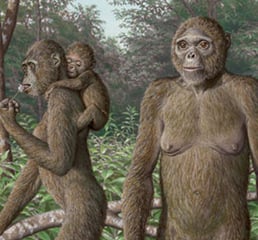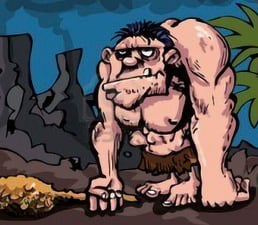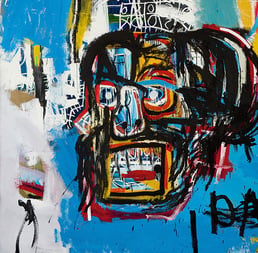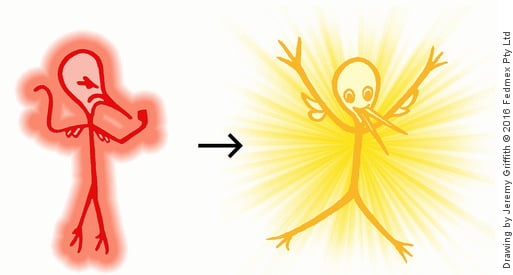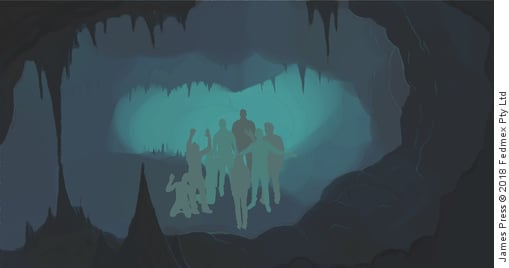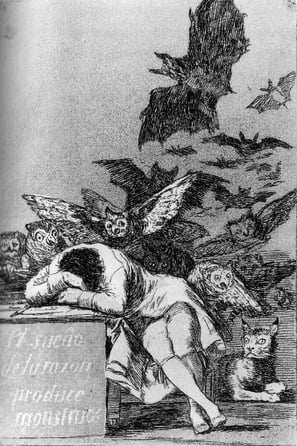Part 3. The key concepts explained in THE Interview
I began TI by pointing out that virtually everyone is living with the belief—well, it’s what we were all taught at school and is reinforced in every documentary—that humans’ competitive, selfish and aggressive behaviour is due to us having savage, must-reproduce-our-genes instincts like other animals have. We make comments like: ‘We are programmed by our genes to try to dominate others and be a winner in the battle of life’; and ‘Our preoccupation with sexual conquest is due to our primal instinct to sow our seeds’; and ‘Men behave abominably because their bodies are flooded with must-reproduce-their-genes-promoting testosterone’; and ‘We want a big house because we are innately territorial’; and ‘Fighting and war is just our deeply-rooted combative animal nature expressing itself’. I did mention that while left-wing thinkers do claim we have some selfless, cooperative instincts, they also say we have this selfish, competitive ‘animal’ side, which, as we will see later, Karl Marx limited to such basic needs as sex, food, shelter and clothing. (paragraphs 15-16 of TI—please note that early transcripts of TI don’t have the paragraphs numbered)
I then explained that this was obviously a false excuse for our selfish, competitive and aggressive human condition because words used to describe our behaviour such as egocentric, arrogant, inspired, depressed, deluded, pessimistic, optimistic, artificial, hateful, cynical, mean, sadistic, immoral, brilliant, guilt-ridden, evil, psychotic, neurotic and alienated, all recognise the involvement of OUR species’ fully conscious thinking mind. They demonstrate that there is a psychological dimension to our behaviour; that we don’t suffer from a genetic-opportunism-driven ‘animal condition’, but a conscious-mind-based, psychologically troubled HUMAN CONDITION. Further, I pointed out that humans have selfless, cooperative and loving moral instincts, the voice or expression of which we call our conscience—which is the complete opposite of selfish, competitive and aggressive instincts. I quoted Charles Darwin saying that ‘The moral sense…affords the best and highest distinction between man and the lower animals’ (The Descent of Man, 1871, ch.4). And I pointed out that to have acquired our selfless, cooperative and loving moral instinctive self or soul our distant ape ancestors must have lived selflessly, cooperatively and lovingly. Our ape ancestors can’t have been brutal, club-wielding, selfish, competitive and aggressive savages as we have been taught, rather they must have lived in a Garden of Eden-like state of selfless, cooperative and loving innocent gentleness. I explained that this selfless, cooperative and loving state was developed through the nurturing of their infants, a process that the bonobo species of ape is currently developing to create their extraordinarily cooperative, loving and gentle behaviour. And I then pointed out that anthropological findings now evidence that our ape ancestors did once live in a cooperative, harmonious state, with, for example, anthropologist C. Owen Lovejoy reporting that ‘our species-defining cooperative mutualism can now be seen to extend well beyond the deepest Pliocene [which is well beyond 5.3 million years ago]’ (‘Reexamining Human Origins in Light of Ardipithecus ramidus’, Science, 2009, Vol.326, No.5949). (pars 19-20 of TI)
It is us humans now who are psychotic angry, egocentric and alienated, seemingly ‘evil’ monsters!
Detail from Jean-Michel Basquiat’s 1982 ‘Untitled’ painting which was sold in May 2017 for US$110.5 million, which, at the time was the sixth most expensive artwork ever sold at auction, no doubt because of its extraordinarily honest portrayal of the true nature of our present horrifically psychologically upset human condition—see Freedom Essay 30.
With regard to being taught at school and told in documentaries that we have selfish, savage, competitive and aggressive, must-reproduce-our-genes instincts, I mentioned that some left-wing thinkers claim that along with selfish, competitive instincts, we do have selfless cooperative instincts. I will explain the dishonest theory that the Left used to supposedly account for how we acquired these selfless instincts more fully later in Part 9, but the following provides a very brief description.
To counter the selfishness-justifying, individualistic, right-wing assertions that we humans are naturally selfish because we have selfish, savage, ‘survival of the fittest’, must-reproduce-our-genes instincts (which we actually don’t have because we have nurtured unconditionally selfless moral instincts), the Left developed equally dishonest selflessness-emphasising theories that maintain that while we do have some selfish, savage, ‘survival of the fittest’, must-reproduce-our-genes instincts, we also have some selfless instincts derived from situations where supposedly cooperation proved a more successful survival strategy than competition. This so-called ‘group selection’ theory for the existence of cooperative instincts within us is false biology because of ‘the tendency of each group to quickly lose its altruism through natural selection favoring cheaters [selfish, opportunistic individuals]’ (‘Can Darwinism improve Binghamton?’, The New York Times, 9 Sep. 2011), as the biologist Jerry Coyne pointed out. The reality under natural selection is, ‘By all means you can help me reproduce my genes but I’m not about to help you reproduce yours’; it was only the extended nurturing of our infants that could overcome genetic selfishness and develop unconditionally selfless behaviour (see Freedom Essay 21). So the right-wing used the false argument that we have savage, must-reproduce-our-genes instincts to justify selfish individualism, and the Left used the equally dishonest argument that we also have group-selected selfless instincts to justify communalism. As is also going to be explained later, left-wing thinkers eventually moved on from the seemingly irreconcilable right-wing biological view that ‘Selfishness is natural’ versus the left-wing biological view that ‘No, selflessness is natural’, to a Marxist-based ‘Bypass biology, just dogmatically impose selfless, cooperative, social, communal values.’ And it is this latter, outrageously dishonest and extremely dangerous so-called Critical Theory that has, since about 2020, been fast replacing the ‘Selfishness is only natural because it’s in our genes’ thinking that has prevailed to date. Yes, what is being taught in schools and presented in documentaries is certainly changing rapidly, and what is going to be explained in this book is just how incredibly false and dangerous this Critical Theory dogma is. In fact, it’s so dangerous it’s threatening to take our species to a death by dogma extinction!
What will now be described is the true explanation for how our original nurtured, completely cooperative, selfless and loving instinctive self (not completely selfish as the right-wing have claimed, or partially selfless and partially selfish as the left-wing has claimed, or neither selfish or selfless as Critical Theorists claim) became corrupted by the emergence in us of competitive and aggressive behaviour when we became a fully conscious species some 2 million years ago. (As explained in pars 705-707 of FREEDOM, 2 million years ago is when our large association-cortexed, thinking brain appeared in the fossil record of our ancestors.)
In TI I used my Adam Stork analogy to present this fully accountable and thus true, instinct vs intellect explanation of our corrupted human condition, where our instinctive orientations unjustly condemned our self-adjusting conscious mind’s need to understand cause and effect; in other words, to search for knowledge. I explained that this conflict between our instincts and intellect unavoidably caused us to become psychologically upset, seemingly evil angry, egocentric and alienated monsters.
Basically, we humans had no choice but to heroically persevere with the upsetting search for knowledge until we found the particular knowledge we needed, which was the redeeming and healing biological explanation for why we corrupted our original all-loving and all-sensitive instinctive self or soul. Until we found that relieving understanding all we could do was continue searching for it, and suffer becoming more and more psychologically upset. In the words from the song The Impossible Dream from the musical the Man of La Mancha, we had to be prepared to ‘march into hell for a heavenly cause’ (lyrics by Joe Darion, 1965); we had to lose ourselves to find ourselves; we had to suffer becoming angry, egocentric and alienated until we found sufficient knowledge to explain ourselves and by so doing rehabilitate and end all our upset. (pars 29-43 of TI)
As I emphasised in TI, what this real instinct vs intellect explanation of the human condition fundamentally does is lift the ‘burden of guilt’ from the human race for destroying the magic world of our soul. It establishes that we humans are good and not bad after all. While we are all inevitably variously angry, egocentric and alienated from our different encounters with humanity’s heroic battle to find knowledge, ultimately self-knowledge, understanding of our corrupted condition, we can now fully understand and know that every human is equally fundamentally good, special and wonderful. In fact, we are all not just good, we are the heroes of the whole story of life on Earth because the conscious mind is surely nature’s greatest invention, and we had to champion its goodness over the ignorance of instincts. Far from being evil, sinful, guilty monsters, we humans are sublimely wonderful, truly divine beings! Best of all, this ability to understand and know there was a good reason why the human race became psychologically upset, is the key, relieving understanding we have been in search of ever since we became conscious some 2 million years ago and our soul-corrupted condition emerged. As the psychoanalyst Carl Jung said, ‘wholeness for humans depends on the ability to own our own shadow’, and since we can now ‘own’ the ‘shadow’ of our species’ 2-million-year-corrupted condition, the human race is finally in a position to become ‘whole’. (pars 106-107 of TI)
I also described how most of our mythologies and all of our religions recognised that we humans did once live in a selfless, cooperative and loving innocent state, and also that it was when we became conscious that everything seemed to go wrong and we became the brutally competitive and aggressive, divisively behaved people we are today. I referred to the examples of Moses’s Garden of Eden story, and to the writings of ancient Greek thinkers Hesiod and Plato. (pars 52-61 of TI)
Crucially though, until science found understanding of the difference between naturally selected orientating genetic instincts and nerve-based, memory-capable, cause-and-effect-understanding consciousness it wasn’t possible to explain the good reason for why we became psychologically upset and soul-corrupted when we became conscious. So while mythologies were able to recognise that becoming conscious somehow caused the corruption of our instinctive self or soul, without science’s understandings of the difference in the way gene-based instincts and the nerve-based conscious intellect work, it wasn’t possible to explain why becoming conscious corrupted our original, gentle and loving, non-conscious instinctive self or soul. (pars 51, 53, 61, 63 of TI)
I then made the point that the more we corrupted our all-loving and all-sensitive, but non-conscious, innocent instinctive self or soul, the more difficult it became to admit the truth that our species did once live in such a wonderful state. The more upset we became, the more shame and guilt we felt, and thus the more we had to hide from the truth of our species’ original state of loving innocence. Hiding in Plato’s famous metaphorical dark cave of denial where no exposing light of truth could reach us, saved us from unbearable condemnation. Yes, in his astonishingly honest 360 dialogue The Republic Plato actually described humans as living in such fear of ‘our human condition’ (and this is the earliest mention I’ve seen of the term) that we have had to ‘take refuge’ ‘a long way underground’ in a dark ‘cave’ so none of the ‘painful’ ‘light’ outside the cave can reach us because it would make ‘visible’ ‘the imperfections of human life’. (Plato’s cave allegory is described in detail in Video/Freedom Essay 11.) Only a very rare few individuals who were fortunate enough to escape encountering upset during their infancy and childhood could dare face the truth of our species’ corrupted human condition and thus think truthfully about it. For everyone else, hiding from the issue of the human condition was paramount.
Just how important blocking out the truth of our 2-million-years soul-corrupted condition has been was made clear by the philosopher René Descartes when he gave this description of the unbearable depression he felt when he tried to confront the issue: ‘So serious are the doubts into which I have been thrown…that I can neither put them out of my mind nor see any way of resolving them. It feels as if I have fallen unexpectedly into a deep whirlpool which tumbles me around so that I can neither stand on the bottom nor swim up to the top’ (Second Meditation, 1641; tr. J. Cottingham, 1984). Yes, as Carl Jung said, ‘When it [our shadow] appears…it is quite within the bounds of possibility for a man to recognize the relative evil of his nature, but it is a rare and shattering experience for him to gaze into the face of [what has until now seemed to be] absolute evil’ (Aion: Researches into the Phenomenology of the Self, 1959; tr. R. Hull, The Collected Works of C.G. Jung, Vol. 9/2, p.10). And when the great poet Gerard Manley Hopkins wrote in his aptly titled poem No Worst, There Is None (1885), ‘O the mind, mind has mountains; cliffs of fall, frightful, sheer, no-man-fathomed’, he also did not exaggerate the depth of depression virtually all humans faced if they allowed their minds to think about our soul-corrupted condition while it was still to be ‘fathomed’/understood. The comedian Rod Quantock certainly wasn’t joking when he said, ‘Thinking can get you into terrible downwards spirals of doubt’ (‘Sayings of the Week’, The Sydney Morning Herald, 5 Jul. 1986). The Nobel Laureate Albert Camus wasn’t overstating the problem either when he wrote that ‘Beginning to think is beginning to be undermined’ (The Myth of Sisyphus, 1942); nor was another Nobel Prize winner, Bertrand Russell, when he said, ‘Many people would sooner die than think’ (Antony Flew, Thinking About Thinking, 1975, p.5 of 127). And nor was yet another Nobel Laureate for Literature, the poet T.S. Eliot, when he wrote that ‘human kind cannot bear very much reality’ (Burnt Norton, 1936). Bono, of the rock band U2, sang about how it was better to not just not think at all, but even be deaf, dumb and blind to the issue of the human condition: ‘It’s been a long hot summer, let’s get under cover, don’t try too hard to think, don’t think at all. I’m not the only one staring at the sun, afraid of what you’d find if you take a look inside. Not just deaf and dumb, I’m staring at the sun, not the only one who’s happy to go blind’ (Staring At The Sun, 1992). The great Spanish artist Francisco Goya also acknowledged the true pain of the human condition when he created the following picture with the words written on it ‘The sleep of reason [letting down our mental guard] brings forth monsters’. (F. Essay 30 describes the excruciating agony adolescents have had to go through learning to resign themselves to living in denial of the until now unexplained, and thus until now unbearably depressing, issue of the corrupted state of the human condition; what a relief it will be for adolescents now that understanding of the human condition has been found to no longer have to go through this horrific process of Resignation. Everyone needs to read the Resignation essay because it makes so much sense of human behaviour.)
Goya’s The sleep of reason brings forth monsters, 1796-97
And so when the upset, soul-corrupted condition developed in humans to the point where trying to face the truth of the extent of it had become unbearable for virtually everyone, a desperate need arose to contrive some excuse for why we had turned utopia into dystopia. And it was at that point that we came up with the patently false excuse that I opened TI with, which is that our ancestors were not gentle, cooperative and loving innocents, but aggressive savages engaged in relentless competition to reproduce their genes like other animals. As I emphasised in TI, false as it is, it was an absolutely brilliant excuse, because instead of our instincts being all-loving and thus unbearably condemning of our present non-loving state, they were made out to be the vicious and brutal must-reproduce-your-genes instincts seen in other animals; and, instead of our conscious mind being the instinct-defying cause of our corruption, which it actually was, it was made out to be the blameless mediating ‘hero’ that had to step in and try to control those supposed vicious instincts within us! We relievingly found a way to make ourselves out to be heroes, which we actually are, but the argument being employed to achieve it was one enormous ‘reverse of the truth’ lie! (pars 63-64 of TI)
The problem for science, our designated vehicle for enquiry, was that to find the true instinct vs intellect explanation of the human condition required confronting and thinking truthfully about our corrupted condition, which, as explained, has been impossible for virtually all humans, which therefore includes virtually all scientists. So while human-condition-avoiding, details-only-focused, so-called ‘mechanistic’, ‘reductionist’ scientists could do all the hard work of finding the crucial details we needed to explain ourselves, of how genes can orientate but only nerves can understand, not being able to confront and think truthfully about the human condition meant they weren’t in a position to assemble that truthful instinct vs intellect explanation—which one of history’s greatest mechanistic scientists, Sir Isaac Newton, recognised when he famously lamented, ‘I can calculate the motion of heavenly bodies but not the madness of people.’ The assemblage of that redeeming insight into the human condition required exceptional innocence because only it was sufficiently unafraid of the issue of the human condition to confront the issue and thus think truthfully about it, which is how the great philosopher Sir Laurens van der Post and I were able to explain the human condition. (Sir Laurens van der Post’s immense contribution to understanding the human condition is explained in F. Essay 51.) Truthful thinking was needed at the end, but all the preparatory hard work was carried out by mechanistic, reductionist scientists. (pars 70-71 of TI)
The issue now that the true, redeeming instinct vs intellect explanation of our corrupted condition has finally been assembled, and thus the need to use the false ‘savage instincts’ excuse has ended, is that most scientists are still so habituated to living in fearful denial of the human condition that they find it difficult even reading about the human condition, let alone absorbing its explanation enough to realise the human condition has finally been explained and made safe to confront. This is the very important to be aware of ‘deaf effect’ stage that has to patiently be negotiated before the world realises we humans are finally liberated from our agonising condition. The fabulous dawn of our species’ emancipation from our corrupted condition has come, but it is going to take a little while for the warmth of those rays of redeeming truth to thaw us all out! (pars 71-74 of TI)
The remainder of TI elaborates on this point, on how everyone can now leave Plato’s horrible dark cave of psychotic and neurotic lies and delusion, and, as was yearned for in the 1960s musical Hair, we can ‘Let the sun shine in’ and achieve ‘the mind’s true liberation’!


